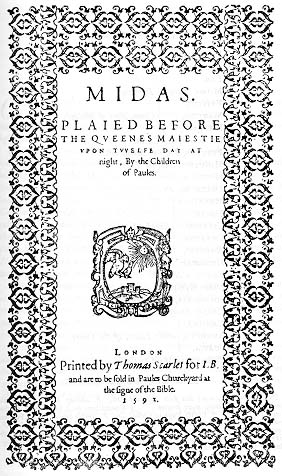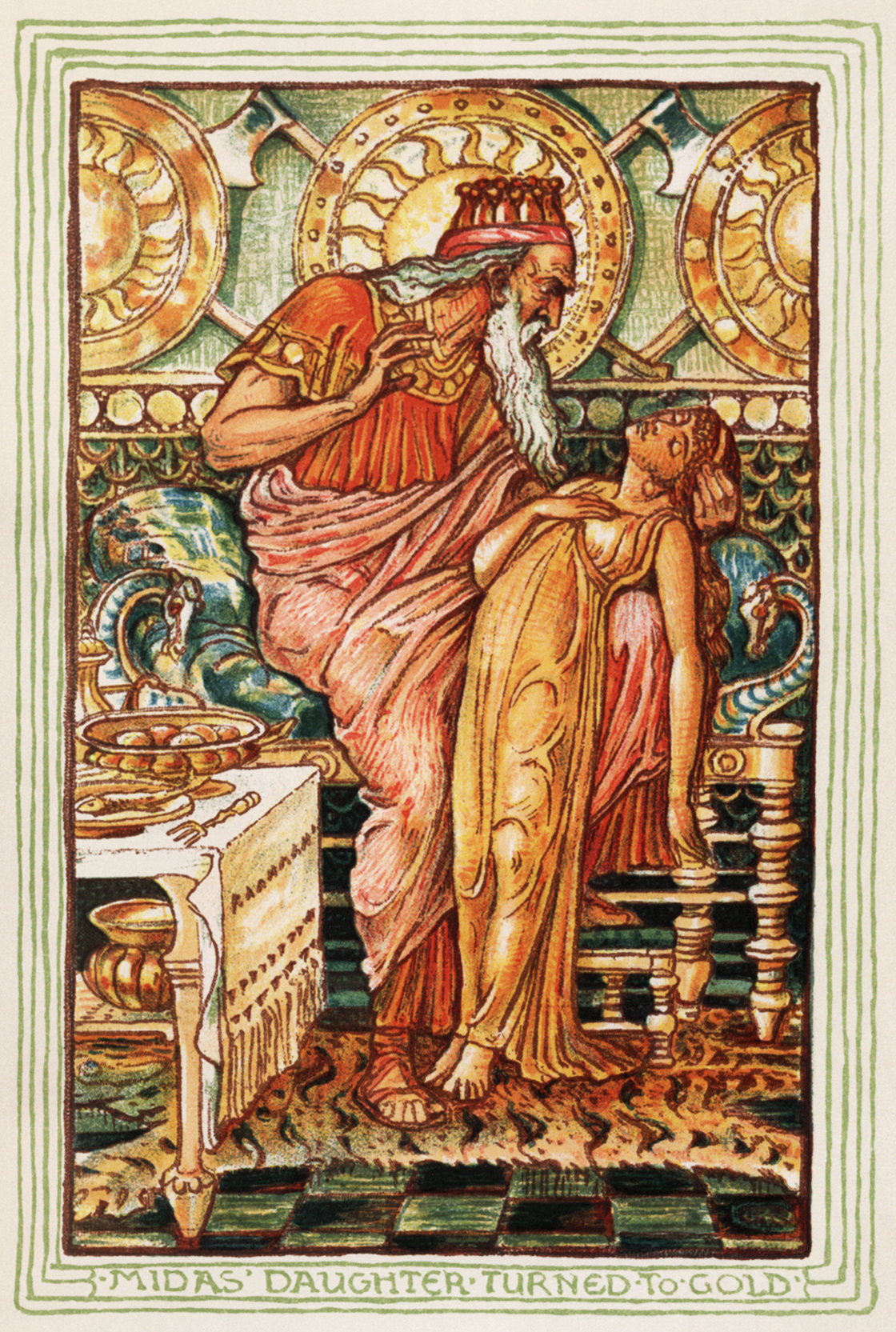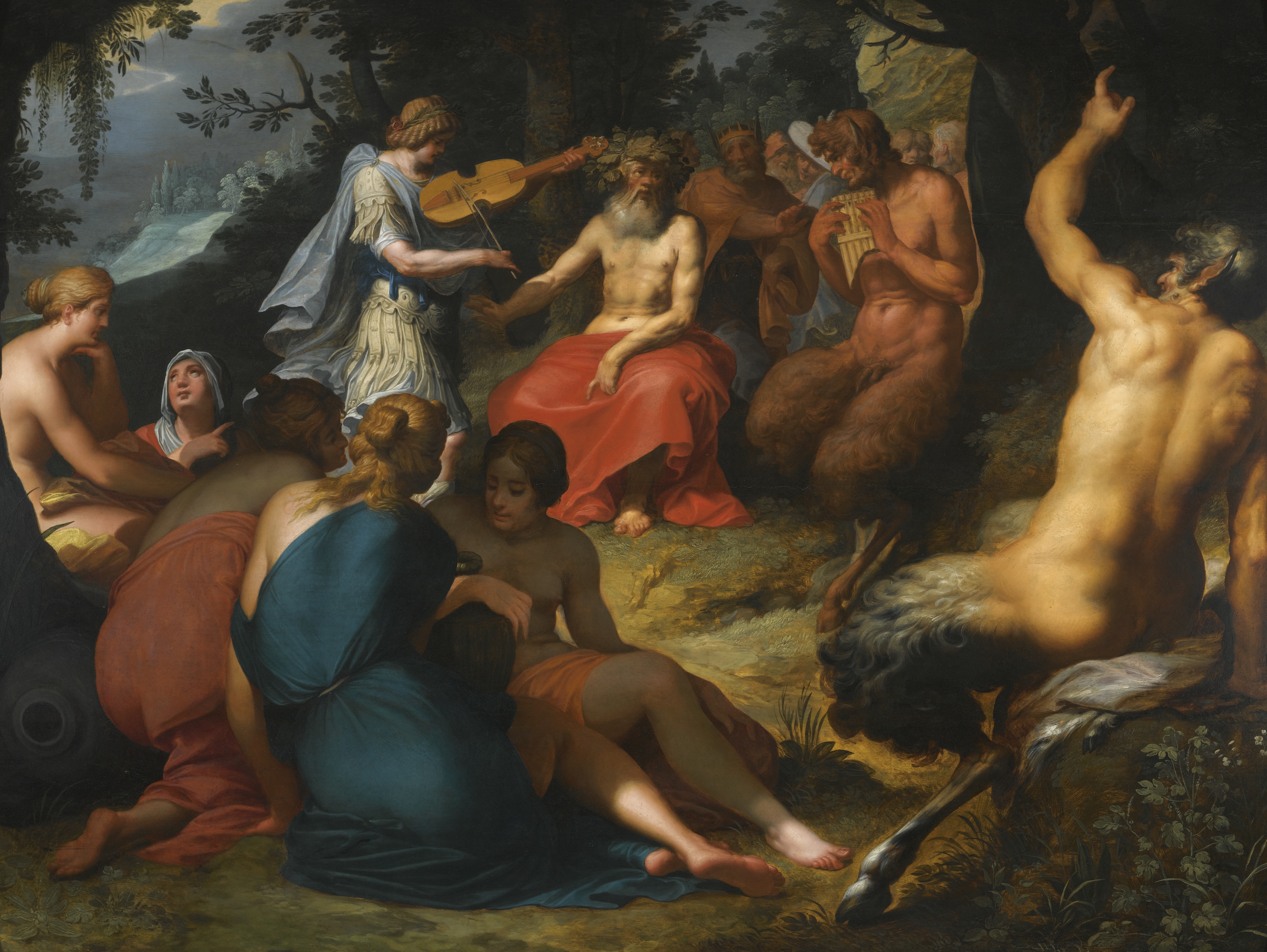|
Midas (Lyly Play)
''Midas'' is an Elizabethan era stage play, a comedy written by John Lyly. It is arguably the most overtly and extensively allegorical of Lyly's allegorical plays. Performance and production ''Midas'' was entered into the Stationers' Register on 4 October 1591; it was first published in 1592 in a quarto printed by Thomas Scarlet for Joan Broome. She was the widow of William Broome, the bookseller who issued reprints of Lyly's ''Campaspe'' and '' Sapho and Phao'' in 1591; the widow Broome herself published the first editions of Lyly's '' Endymion'' (1591) and '' Gallathea'' (1592). ''Midas'' was probably acted by the Children of Paul's, Lyly's regular company through most of his playwriting career. The title page of the first edition states that the play was performed at Court on Twelfth Night, probably on 6 January 1590. John Dover Wilson proposed that Lyly himself may have played the role of Midas; but this is a speculation unsupported by evidence. "Obviously" the play w ... [...More Info...] [...Related Items...] OR: [Wikipedia] [Google] [Baidu] |
Midas John Lyly
Midas (; ) was a king of Phrygia with whom many myths became associated, as well as two later members of the Phrygian royal house. His father was Gordias, and his mother was Cybele. The most famous King Midas is popularly remembered in Greek mythology for his ability to turn everything he touched into pure gold and this came to be called the ''golden touch'', or the ''Midas touch''. The legends told about this Midas and his adopted father Gordias, credited with founding the Phrygian capital city Gordium and tying the Gordian Knot, indicate that they were believed to have lived sometime in the 2nd millennium BC, well before the Trojan War. However, Homer does not mention Midas or Gordias, while instead mentioning two other Phrygian kings, Mygdon and Otreus. Midaeum was presumably named after him, and this is probably also the Midas that according to Pausanias founded Ancyra (today known as Ankara). Another King Midas ruled Phrygia in the late 8th century BC. Most historians b ... [...More Info...] [...Related Items...] OR: [Wikipedia] [Google] [Baidu] |
Spanish Armada
The Spanish Armada (often known as Invincible Armada, or the Enterprise of England, ) was a Spanish fleet that sailed from Lisbon in late May 1588, commanded by Alonso de Guzmán, Duke of Medina Sidonia, an aristocrat without previous naval experience appointed by Philip II of Spain. His orders were to sail up the English Channel, join with the Duke of Parma in Flanders, and escort an invasion force that would land in England and overthrow Elizabeth I. Its purpose was to reinstate Catholicism in England, end support for the Dutch Republic, and prevent attacks by English and Dutch privateers against Spanish interests in the Americas. The Spanish were opposed by an English fleet based in Plymouth. Faster and more manoeuvrable than the larger Spanish galleons, its ships were able to attack the Armada as it sailed up the Channel. Several subordinates advised Medina Sidonia to anchor in the Solent and occupy the Isle of Wight, but he refused to deviate from his instructions to ... [...More Info...] [...Related Items...] OR: [Wikipedia] [Google] [Baidu] |
Nymph
A nymph (; ; sometimes spelled nymphe) is a minor female nature deity in ancient Greek folklore. Distinct from other Greek goddesses, nymphs are generally regarded as personifications of nature; they are typically tied to a specific place, landform, or tree, and are usually depicted as Virginity, maidens. Because of their association with springs, they were often seen as having healing properties; other divine powers of the nymphs included divination and shapeshifting. In spite of their divine nature, they were not immortality, immortal. Nymphs are divided into various Nymph#List, broad subgroups based on their habitat, such as the Meliae (ash tree nymphs), the Dryads (oak tree nymphs), the Alseids (Grove (nature), grove nymphs), the Naiads (Spring (hydrology), spring nymphs), the Nereids (sea nymphs), the Oceanids (ocean nymphs), and the Oreads (mountain nymphs). Other nymphs included the Hesperides (evening nymphs), the Hyades (mythology), Hyades (rain nymphs), and the Pleiade ... [...More Info...] [...Related Items...] OR: [Wikipedia] [Google] [Baidu] |
Pan (mythology)
In ancient Greek religion and mythology, Pan (; ) is the god of the wild, shepherds and flocks, rustic music and impromptus, and companion of the nymphs. He has the hindquarters, legs, and horns of a goat, in the same manner as a faun or satyr. With his homeland in rustic Arcadia, he is also recognized as the god of fields, groves, wooded glens, and often affiliated with sex; because of this, Pan is connected to fertility and the season of spring. In Roman religion and myth, Pan was frequently identified with Faunus, a nature god who was the father of Bona Dea, sometimes identified as Fauna; he was also closely associated with Silvanus, due to their similar relationships with woodlands, and Inuus, a vaguely-defined deity also sometimes identified with Faunus. In the eighteenth and nineteenth centuries, Pan became a significant figure in the Romantic movement of Western Europe and also in the twentieth-century Neopagan movement. Origins Many modern scholars consider Pan ... [...More Info...] [...Related Items...] OR: [Wikipedia] [Google] [Baidu] |
Apollo
Apollo is one of the Twelve Olympians, Olympian deities in Ancient Greek religion, ancient Greek and Ancient Roman religion, Roman religion and Greek mythology, Greek and Roman mythology. Apollo has been recognized as a god of archery, music and dance, truth and prophecy, healing and diseases, the Sun and light, poetry, and more. One of the most important and complex of the Greek gods, he is the son of Zeus and Leto, and the twin brother of Artemis, goddess of the hunt. He is considered to be the most beautiful god and is represented as the ideal of the ''kouros'' (ephebe, or a beardless, athletic youth). Apollo is known in Greek-influenced Etruscan mythology as ''Apulu''. As the patron deity of Delphi (''Apollo Pythios''), Apollo is an oracular god—the prophetic deity of the Pythia, Delphic Oracle and also the deity of ritual purification. His oracles were often consulted for guidance in various matters. He was in general seen as the god who affords help and wards off e ... [...More Info...] [...Related Items...] OR: [Wikipedia] [Google] [Baidu] |
Lesbos
Lesbos or Lesvos ( ) is a Greek island located in the northeastern Aegean Sea. It has an area of , with approximately of coastline, making it the third largest island in Greece and the List of islands in the Mediterranean#By area, eighth largest in the Mediterranean. It is separated from Anatolia, Asia Minor by the narrow Mytilini Strait. On the southeastern coast is the island's capital and largest city, Mytilene (), whose name is also used for the island as a whole. Lesbos is a separate regional units of Greece, regional unit with the seat in Mytilene, which is also the capital of the larger North Aegean region. The region includes the islands of Lesbos, Chios, Ikaria, Lemnos, and Samos. The total population of the island was 83,755 in 2021. A third of the island's inhabitants live in the capital, while the remainder are concentrated in small towns and villages. The largest are Plomari, Agia Paraskevi, Lesbos, Agia Paraskevi, Polichnitos, Agiassos, Eresos, Gera, Lesbos, Gera, an ... [...More Info...] [...Related Items...] OR: [Wikipedia] [Google] [Baidu] |
Gold
Gold is a chemical element; it has chemical symbol Au (from Latin ) and atomic number 79. In its pure form, it is a brightness, bright, slightly orange-yellow, dense, soft, malleable, and ductile metal. Chemically, gold is a transition metal, a group 11 element, and one of the noble metals. It is one of the least reactivity (chemistry), reactive chemical elements, being the second-lowest in the reactivity series. It is solid under standard temperature and pressure, standard conditions. Gold often occurs in free elemental (native state (metallurgy), native state), as gold nugget, nuggets or grains, in rock (geology), rocks, vein (geology), veins, and alluvial deposits. It occurs in a solid solution series with the native element silver (as in electrum), naturally alloyed with other metals like copper and palladium, and mineral inclusions such as within pyrite. Less commonly, it occurs in minerals as gold compounds, often with tellurium (gold tellurides). Gold is resistant to ... [...More Info...] [...Related Items...] OR: [Wikipedia] [Google] [Baidu] |
Phrygia
In classical antiquity, Phrygia ( ; , ''Phrygía'') was a kingdom in the west-central part of Anatolia, in what is now Asian Turkey, centered on the Sangarios River. Stories of the heroic age of Greek mythology tell of several legendary Phrygian kings: * Gordias, whose Gordian Knot would later be cut by Alexander the Great * Midas, who turned whatever he touched to gold * Mygdon, who warred with the Amazons According to Homer's ''Iliad'', the Phrygians participated in the Trojan War as close allies of the Trojans, fighting against the Achaeans. Phrygian power reached its peak in the late 8th century BC under another historical king, Midas, who dominated most of western and central Anatolia and rivaled Assyria and Urartu for power in eastern Anatolia. This later Midas was, however, also the last independent king of Phrygia before Cimmerians sacked the Phrygian capital, Gordium, around 695 BC. Phrygia then became subject to Lydia, and then successivel ... [...More Info...] [...Related Items...] OR: [Wikipedia] [Google] [Baidu] |
Dionysus
In ancient Greek religion and Greek mythology, myth, Dionysus (; ) is the god of wine-making, orchards and fruit, vegetation, fertility, festivity, insanity, ritual madness, religious ecstasy, and theatre. He was also known as Bacchus ( or ; ) by the Greeks (a name later adopted by the Ancient Rome, Romans) for a frenzy he is said to induce called ''baccheia''. His wine, music, and ecstatic dance were considered to free his followers from self-conscious fear and care, and subvert the oppressive restraints of the powerful. His ''thyrsus'', a fennel-stem sceptre, sometimes wound with ivy and dripping with honey, is both a beneficent wand and a weapon used to destroy those who oppose his Cult of Dionysus, cult and the freedoms he represents. Those who partake of his mysteries are believed to become possessed and empowered by the god himself. His origins are uncertain, and his cults took many forms; some are described by ancient sources as Thrace, Thracian, others as Greek. In O ... [...More Info...] [...Related Items...] OR: [Wikipedia] [Google] [Baidu] |
Ovid
Publius Ovidius Naso (; 20 March 43 BC – AD 17/18), known in English as Ovid ( ), was a Augustan literature (ancient Rome), Roman poet who lived during the reign of Augustus. He was a younger contemporary of Virgil and Horace, with whom he is often ranked as one of the three Western canon, canonical poets of Latin literature. The Roman Empire, Imperial scholar Quintilian considered him the last of the Latin love elegy, elegists.Quint. ''Inst.'' 10.1.93 Although Ovid enjoyed enormous popularity during his lifetime, the emperor Augustus Exile of Ovid, exiled him to Constanța, Tomis, the capital of the newly-organised province of Moesia, on the Black Sea, where he remained for the last nine or ten years of his life. Ovid himself attributed his banishment to a "poem and a mistake", but his reluctance to disclose specifics has resulted in much speculation among scholars. Ovid is most famous for the ''Metamorphoses'', a continuous mythological narrative in fifteen books written in ... [...More Info...] [...Related Items...] OR: [Wikipedia] [Google] [Baidu] |
Metamorphoses
The ''Metamorphoses'' (, , ) is a Latin Narrative poetry, narrative poem from 8 Common Era, CE by the Ancient Rome, Roman poet Ovid. It is considered his ''Masterpiece, magnum opus''. The poem chronicles the history of the world from its Creation myth, creation to the deification of Julius Caesar in a mythico-historical framework comprising over 250 myths, 15 books, and 11,995 lines. Although it meets some of the criteria for an epic poem, epic, the poem defies simple genre classification because of its varying themes and tones. Ovid took inspiration from the genre of metamorphosis poetry. Although some of the ''Metamorphoses'' derives from earlier treatment of the same myths, Ovid diverged significantly from all of his models. The ''Metamorphoses'' is one of the most influential works in Western culture. It has inspired such authors as Dante Alighieri, Giovanni Boccaccio, Geoffrey Chaucer, and William Shakespeare. Numerous episodes from the poem have been depicted in works ... [...More Info...] [...Related Items...] OR: [Wikipedia] [Google] [Baidu] |
Midas
Midas (; ) was a king of Phrygia with whom many myths became associated, as well as two later members of the Phrygian royal house. His father was Gordias, and his mother was Cybele. The most famous King Midas is popularly remembered in Greek mythology for his ability to turn everything he touched into pure gold and this came to be called the ''golden touch'', or the ''Midas touch''. The legends told about this Midas and his adopted father Gordias, credited with founding the Phrygian capital city Gordium and tying the Gordian Knot, indicate that they were believed to have lived sometime in the 2nd millennium BC, well before the Trojan War. However, Homer does not mention Midas or Gordias, while instead mentioning two other Phrygian kings, Mygdon of Phrygia, Mygdon and Otreus. Midaeum was presumably named after him, and this is probably also the Midas that according to Pausanias (geographer), Pausanias founded Ancyra (today known as Ankara). Another King Midas ruled Phrygia in t ... [...More Info...] [...Related Items...] OR: [Wikipedia] [Google] [Baidu] |











